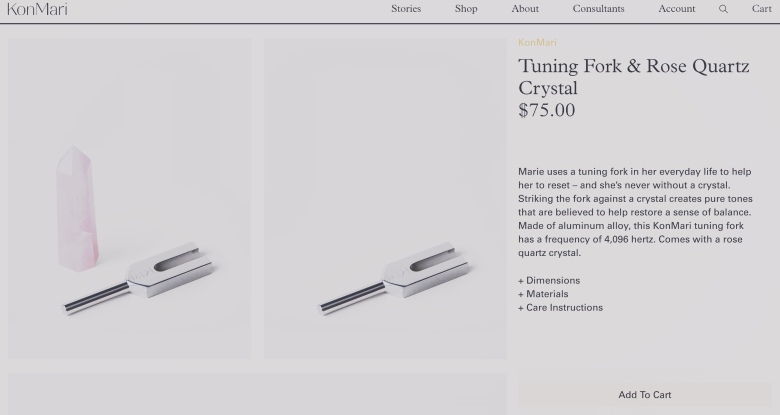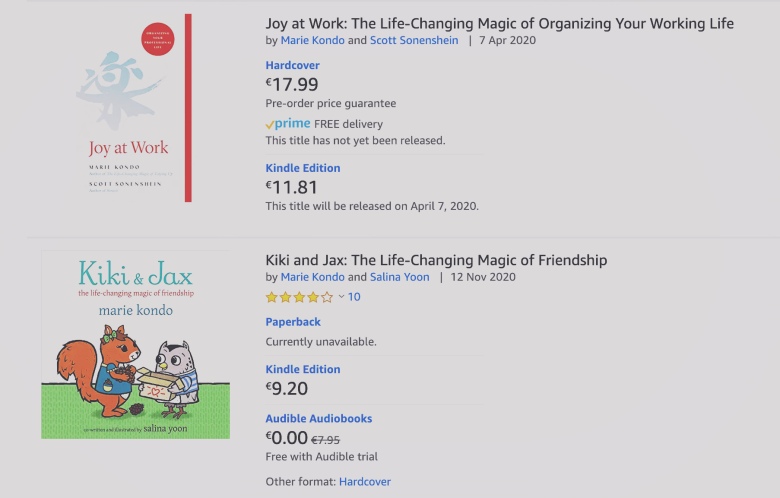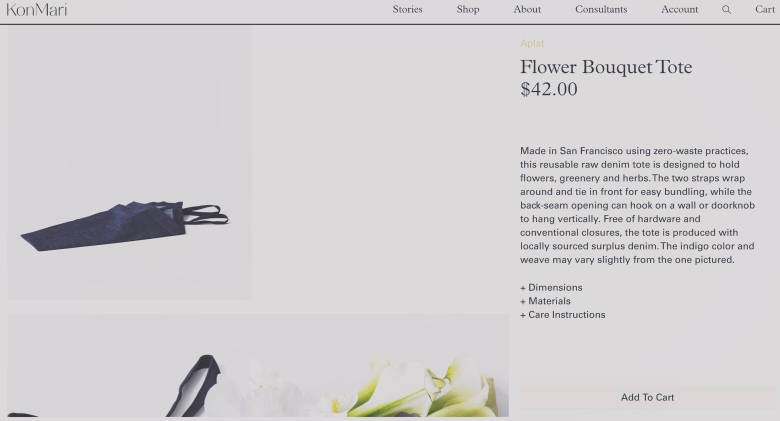…and sh*t hits the fan. Or rather, the shelves. And timelines. Because Karen feels betrayed, and she wants to talk about it.
As a result, the minimalism/decluttering/conscious consuming online community goes crazy, in opposite directions. Die-hard fans and design aficionados joyfully anticipate forthcoming sparks of joy from ordering a $200 tea container or a $75 tuning fork with rose quartz. Haters meanwhile have a field day, Twitter and Instagram are abuzz with hilarious comments regarding Kondo’s new business venture. What once again seems to be overlooked is the fact that Marie Kondo is no minimalism preacher but an organizer. She is about organizing the stuff you love and/or use regularly, throwing out what doesn’t make you happy (‘spark joy’). She is not preaching the magic of packing parties or no buy years.

“Keep only those things that speak to your heart”
I get it. The woman who aims for empty surfaces and freedom from all clutter suddenly sells items no one needs at prices that may not be affordable for everyone — me for example. She’s already sold us three books when one would have been quite sufficient (not sure we really need The Life-Changing Manga of Tidying up or Spark Joy when every information one needs can be found in The Life-Changing Magic of Tidying up, her first book?). This only being the start, she will sell us two more books — a children’s book on friendship (Kiki & Jax: The Life-Changing Magic of Friendship) and one on decluttering your workspace/workplace (Joy at Work: The Life-Changing Magic of Organizing your Working Life) — in 2020. While I won’t comment on the children’s book for obvious reasons, I’m not sure someone who sends her socks on vacation every time she puts them in a drawer is the best advisor when it comes to Western work environments. And yes, this is something to consider. Not because Japanese work culture on average is known for its leniency and humanity, but because there are differences between Japanese, US, and European societies on various levels.
Let’s, for one moment, regard Marie Kondo’s work as a Shinto shrine attendant. Shinto in the West is often portrayed as “animism, which teaches that the material world is inhabited by kami or spirits, such that living a good life means residing in harmony with these spirits.” Thanking items for their work before putting them away (or wishing your socks a lovely time in the drawer) could be a result of this philosophy. Yet, I don’t know enough about Shinto and Marie Kondo to be sure, and I don’t want to orientalize her all over the place. Let’s just say that the world is full of different perspectives and realities and while this is fascinating, it can also lead to misunderstandings and misconceptions. Like why I should own 20 credit cards and shuffle my debts from one to the other. Why a siesta is absolutely necessary and if I want to get some lunch, I should’ve brought some. Or why I should thank my socks.

Lifestyle marketing is capitalism deluxe
Modern (Western) capitalism only knows one way towards success: continuous growth. So opening a shop to sell KonMari lifestyle items is obviously the next thing in line for the KonMari empire, led by Marie Kondo and her husband, Takumi Kawahara. Having released her Netflix series Tidying up with Marie Kondo earlier this year, opening an online shop just a few months later is good timing. Not too much ‘in your face’ but soon enough that she’s still fresh in the audience’s minds.
And it’s not like capitalism and self-care philosophies don’t go well together.
Consider, for a moment, the phenomenon of HYGGE. “Hygge” itself is just a Danish (and Norwegian) word that refers to coziness, a lovely, cozy mood. Overall, one could describe it as a sort of Danish mentality that values togetherness, cozy settings, and wellbeing. Enter Meik Wiking and co. who book by book started selling us the idea of Hygge as a lucrative marketing concept. And we bought it: candles, cozies, blankets, beige home decor, knitting kits. Yet, people in Denmark aren’t just happy because they live in a world full of cozy blankets and lovely interpersonal relations, they also live in a country that provides government welfare, a high wage level, and what Americans like to call ‘free health care’. Long story short: when you can afford to lose your job or get sick, it’s much easier to be amongst the happiest people on earth, hygge or not. However, scented candles and polyester blankets are more profitable than paying fair wages or providing affordable healthcare and education, so it’s easier to sell people the fake marketing concept of hygge instead of creating a reality that would provide the basis for some real hygge.

KonMari and capitalism
But I digress. Marie Kondo jumped the bandwagon and started selling the KonMari feeling. If we accept hygge and all the sh*t Gwynnie, Martha, Reese, and the other blond, white, Western media personalities throw at us, we sure can cut Marie some slack — don’t you think, Karen?
The items she sells are elegant, well-designed, and nice to look at. Of course, a tea container also serves a certain purpose; more so than a computer brush or a flower bouquet tote. Still, nothing Marie sells us is important OR something we may not already have. But hey, why shouldn’t she at least try? No one has to buy it. There are people out there buying overpriced stuff from a mediocre blond actress who made an empire out of selling shit no one needs — and I’m not just talking about Goop. So why should Marie, with her well thought out concept of sparking joy, not at least try? No one has to watch her show. No one has to buy her books. No one has to feed the money-making monster.
Also, while we’re at it, what’s about all those influencers who promote slow fashion, conscious living/consumerism, and minimalism, and still regularly present new stuff? Yes, they get free samples from mainly independent companies and small labels that are more often than not worth mentioning and promoting BUT what is slow, conscious, or minimalist about presenting new skin care, clothing, bags, jewellery, or the like every other week on the gram? Is it even possible to withdraw from classic consumer capitalism in the way of simply not wanting new things anymore and being content with what one already has? I guess so. I hope so. I’m sure as hell trying my best. Because I don’t want to KonMari my stuff every few years.
Well, capitalism is fun — for those who can survive it.
BTW: there’s an interesting article on VICE regarding Marie’s new shop; the NYT too writes about the dubious nature of the backlash Marie is receiving for her new online store. As I like to say: gray areas everywhere…
